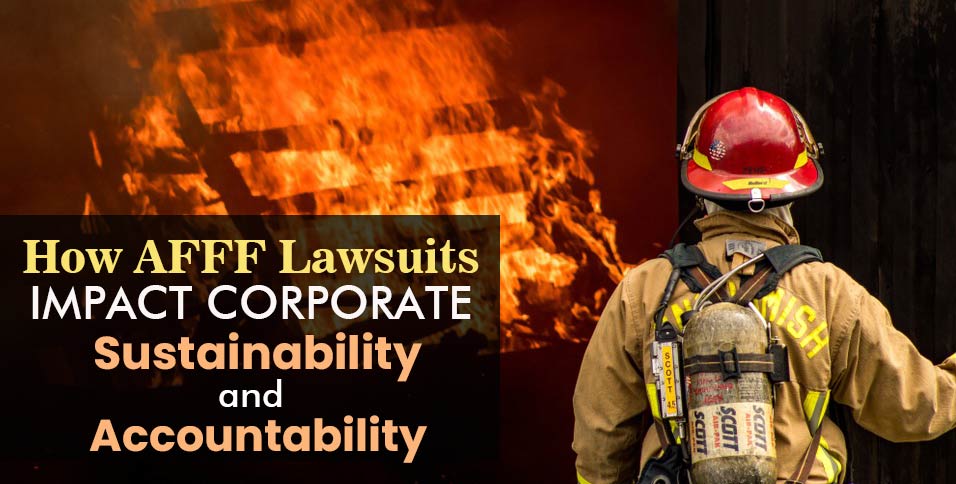Aqueous film-forming foam (AFFF) has been a vital tool in the arsenal of firefighters, military personnel, and industrial facilities for combating flammable liquid fires. However, the use of AFFF has come under scrutiny due to the presence of per- and polyfluoroalkyl substances (PFAS) in the foam.
These chemicals have been linked to a range of serious health problems, including cancer, leading to a surge in AFFF lawsuits. As noted by ConsumerNotice.org, there are 5,227 lawsuits pending in the litigation. Under this litigation, manufacturers of AFFF are facing increasing pressure to take responsibility for the consequences of their products.
In this article, we will discuss the far-reaching implications of AFFF) lawsuits on corporate sustainability and accountability.
Corporate Accountability in the Face of AFFF Lawsuits
The AFFF lawsuit has cast a significant spotlight on corporate accountability. Manufacturers such as 3M and other industry players find themselves under increasing scrutiny. This is because of their role in the production of goods containing PFAS chemicals.
According to a recent update by AboutLawsuits, 3M has recently offered a settlement worth $12.5 billion to plaintiffs. If approved, these could potentially be one of the biggest settlements in the history of environmental litigation in the U.S.
The lawsuits allege that these companies were aware of the risks associated with PFAS in AFFF but failed to adequately inform the public. This has raised important questions about the ethical and legal obligations of corporations regarding product safety.
Environmental Impact and Sustainability Concerns
The environmental impact of AFFF and the subsequent PFAS contamination is at the heart of sustainability concerns. PFAS substances are notoriously persistent, and they do not readily break down in the environment.
This persistence results in long-term pollution of water bodies, soil, and ecosystems. As a result, the sustainability of the environment is directly impacted, emphasizing the need for responsible and sustainable corporate practices. CDC notes that due to its widespread use and bioaccumulative nature, PFAS is found in the blood of 97% of Americans.
Health Implications and Public Outcry
According to TorHoerman Law, AFFF lawsuits have highlighted the severe health implications associated with exposure to PFAS. These implications, notably the link between PFAS and cancer, have sparked public outrage.
Communities affected by PFAS contamination have taken legal action against manufacturers. This has placed immense pressure on these companies to address the health concerns and take measures to protect public well-being. This highlights the significance of swift action to address public health concerns.
The Role of Regulation and Oversight
The role of regulatory bodies and their oversight in permitting the use of AFFF is another aspect highlighted by these lawsuits. It raises questions about whether existing regulations and oversight mechanisms are sufficient to protect public health and the environment from harmful substances.
These cases are leading to calls for more stringent regulations and better enforcement to prevent similar issues in the future. They do so by emphasizing the role of regulatory agencies in safeguarding public health.
MDL: A Test of Accountability
AFFF lawsuits often culminate in multidistrict litigation (MDL) as a way to handle multiple cases from various locations. The consolidation of these cases serves as a litmus test for corporate accountability on a larger scale.
MDL underscores the importance of holding corporations responsible for their actions, and it provides a platform for plaintiffs to seek justice collectively. It demonstrates the power of collective action in seeking accountability and justice.
AFFF Lawsuits as a Catalyst for Change
These lawsuits can be a catalyst for change in corporate practices. As the AFFF controversy unfolds, it emphasizes the need for businesses to adopt more responsible and sustainable practices.
These cases are expected to encourage accountability on the manufacturers’ end when producing potentially harmful products. This paves the way for a more sustainable and accountable corporate landscape.
The Path Forward for Corporate Sustainability
The outcome of AFFF lawsuits will significantly influence the path forward for corporate sustainability. Companies must now reevaluate their product development, testing, and disclosure practices.
To prevent similar issues in the future, they need to prioritize sustainability, transparency, and ethical conduct in their business operations. Adopting a proactive and responsible approach is crucial in avoiding similar cases in the future.
Final Word
Aqueous film-forming foam (AFFF) lawsuits are a potent catalyst for change in the realms of corporate accountability, environmental sustainability, and public health. These legal battles have forced corporations to confront the ethical and legal obligations they bear regarding product safety and transparency.
Moreover, they underscore the urgent need for more robust regulatory oversight to safeguard public well-being and environmental sustainability. The multidistrict litigation process exemplifies the collective power of seeking accountability.
Ultimately, the AFFF lawsuits demand a shift towards more responsible, transparent, and sustainable corporate practices. The outcomes of these cases will undoubtedly shape the future, urging businesses to prioritize ethical conduct to avoid similar cases.
Also Read: Facebook sued with two antitrust lawsuits















